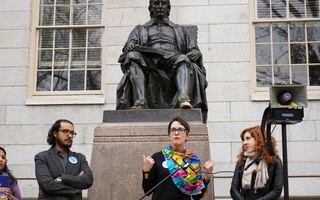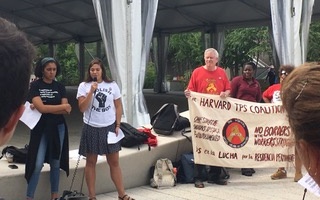{shortcode-f8a6f364972a063c0fb952e47f3b6475149a8a0c}
Around fifty students, employees, and activists congregated in Emerson Hall Monday afternoon to hear a panel of three Harvard workers discuss the impact changes to Temporary Protected Status will have on individual workers and union power.
TPS is a program started by Congress in 1990 to offer temporary humanitarian relief in the United States to individuals whose home countries are affected by armed conflict and natural disasters. The Trump administration has recently scaled back TPS protections for immigrants from a number of countries,including El Salvador, Sudan, Haiti and Nicaragua.
Monday’s panel was a joint effort between the Harvard Union of Clerical and Technical Workers, UNITE HERE Local 26, and the 32BJ chapter of the Service Employees International Union—a unified effort of three unions representing Harvard workers that moderator Genevieve LeChat, a HUCTW member, said was uncommon.
Panelists included Harvard University Dining Services employee Martha I. Bonilla, and Harvard custodians and 32BJ SEIU members Doris Reina-Landaverde and Julio A. Perez. Perez, who is also a member of the Massachusetts TPS Committee, emphasized his concern that the loss of TPS protections could mean a decline in union membership.
“Probably 70 percent of SEIU members are immigrants like me, with TPS, or with different problems,” Perez said. “The termination of the TPS—I don’t have to say, we all know—is going to ruin the unions. They will be broken down, because they will have very few members.”
Others agreed, mentioning that a union gains organizing strength from its membership.
“I think it’s a huge number [of TPS recipients], and they know if the unions lose these members, this will break the workers. It will affect the workers,” Reina-Landaverde said.
“The union is not the building or the organization. We are the union,” she added.
Some panel attendees said they believe the changes to TPS are one component of an effort by the Trump administration to weaken unions.
“This is the first opening salvo in an attack on unions. They’re led by immigrants; they’re rapidly growing. They are being dismantled by the administration because they give workers a chance to organize,” Ander P. Pierce, a Tufts student and panel attendee, said.
Members of the panel said they have been working to increase public awareness of TPS in the months before it is scheduled to expire.
For Perez, this included driving four hours for a six-minute interview on a local television channel about TPS last week.
“We are working against the clock. It has been set against us,” Perez said. “We are moving forward.”
Others agreed and said they have been trying to show how the impact of the TPS changes extend beyond just those who have TPS status.
“What we are pleading today is not just to listen but to understand that this is your issue, whatever constituency you are part of,” Edward B. Childs, a chef in Adams House and chief steward of UNITE HERE Local 26, said.
—Staff writer Edith M. Herwitz can be reached at edith.herwitz@thecrimson.com. Follow her on Twitter @edith_herwitz
—Staff writer Molly C. McCafferty can be reached at molly.mccafferty@thecrimson.com. Follow her on Twitter at @mollmccaff.
Read more in University News
Act on a Dream Hosts Conference at HarvardRecommended Articles
-
Calling for Permanent, Not Temporary, Protected StatusJust as Faust has shown continuous support for undocumented students, she should show support for TPS recipients as well.
-
 Students, Workers Rally to Support TPS Recipients
Students, Workers Rally to Support TPS Recipients -
 Harvard Activists Hold Rally on Campus to Advocate for TPS Recipients, Prison Reform
Harvard Activists Hold Rally on Campus to Advocate for TPS Recipients, Prison Reform -
 Harvard Affiliates with TPS Breathe Sigh of Relief Following Court Ruling
Harvard Affiliates with TPS Breathe Sigh of Relief Following Court Ruling -
 Harvard Workers and Students March for TPS in Washington, D.C.
Harvard Workers and Students March for TPS in Washington, D.C.













